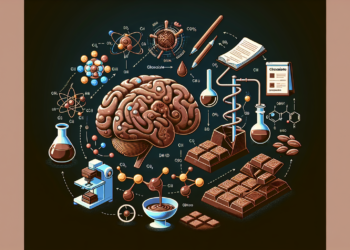Indulging in a rich, velvety piece of chocolate can transport you to a state of pure bliss. But have you ever wondered why we crave chocolate so intensely? Delve into the fascinating world of chocolate psychology as we uncover the reasons behind this irresistible desire and explore how this delectable treat can play a significant role in influencing our moods. From the science behind its addictive qualities to the psychological benefits it can bring, get ready to unlock the secrets behind our unrelenting love affair with chocolate. So, sit back, relax, and prepare yourself for a journey into the delightful world of chocolate.

The Science Behind Chocolate Cravings
The Role of Dopamine in Chocolate Cravings
Have you ever wondered why you can’t resist that delicious piece of chocolate? Well, one of the key reasons lies in the role of dopamine in chocolate cravings. Dopamine is a neurotransmitter in the brain that plays a significant role in our reward system. When we consume chocolate, it stimulates the release of dopamine, giving us a sense of pleasure and satisfaction. This surge in dopamine creates a positive association with chocolate, leading to a craving for more.
The Influence of Serotonin Levels on Chocolate Cravings
Another important factor in chocolate cravings is the influence of serotonin levels. Serotonin is a neurotransmitter that regulates our mood and contributes to feelings of well-being. Chocolate contains tryptophan, an amino acid that increases the production of serotonin in the brain. As serotonin levels rise, we experience a boost in mood and a sense of relaxation. This connection between chocolate and increased serotonin levels can intensify our cravings for that sweet treat.
The Impact of Endorphins and Chocolate Consumption
When it comes to chocolate cravings, we can’t overlook the impact of endorphins. Endorphins are chemicals produced by the brain that act as natural painkillers and mood elevators. Consumption of chocolate triggers the release of endorphins, creating feelings of pleasure and euphoria. As a result, we may find ourselves seeking out chocolate to experience those pleasurable sensations. The combination of dopamine, serotonin, and endorphins makes chocolate a powerful and irresistible treat for many of us.
Psychological Factors That Influence Chocolate Cravings
Association and Conditioning with Chocolate
Our minds are highly influenced by the associations we make, and one powerful psychological factor in chocolate cravings is association and conditioning. From an early age, we often receive chocolate as a reward, whether it be as a treat for good behavior or a celebration. These positive associations and conditioning link chocolate to feelings of pleasure and reward, making it difficult to resist when faced with cravings.
Emotional Comfort and Chocolate
Chocolate is often linked to emotional comfort, and this connection can have a significant influence on our cravings. During times of stress, sadness, or loneliness, we may turn to chocolate as a source of solace and emotional support. The act of eating chocolate can provide a temporary distraction from negative emotions and create a sense of comfort and indulgence. Thus, our cravings for chocolate may be driven by the desire for emotional comfort.
The Role of Stress in Chocolate Cravings
Stress is a common factor that can trigger chocolate cravings. When we experience stress, our bodies release cortisol, a hormone that stimulates appetite and increases food cravings. Additionally, consuming chocolate can help to reduce stress by promoting the release of endorphins, which act as natural stress relievers. This makes chocolate an appealing choice in times of stress, contributing to our cravings.
Cultural and Social Factors in Chocolate Cravings
Cultural and social factors play a significant role in our cravings for chocolate. In many cultures, chocolate is associated with special occasions, holidays, and celebrations. These cultural norms and traditions reinforce the idea that chocolate is a pleasurable and indulgent treat. Furthermore, the social aspect of sharing and enjoying chocolate with friends and loved ones can enhance our desire for it. The influence of cultural and social factors cannot be underestimated when it comes to our cravings for chocolate.
The Mood-Boosting Effects of Chocolate
Chocolate as a Mood Enhancer
One of the reasons we crave chocolate is because of its mood-enhancing effects. The consumption of chocolate triggers the release of neurotransmitters such as dopamine, serotonin, and endorphins, which can significantly improve our mood. These neurotransmitters create a sense of happiness, pleasure, and relaxation, making chocolate a go-to choice when we’re feeling down or in need of a mood boost.
The Relationship Between Chocolate and Happiness
Chocolate and happiness often go hand in hand. When we eat chocolate, it stimulates the pleasure centers in our brain, leading to an increase in positive emotions and a sense of well-being. The taste, smell, and texture of chocolate can evoke feelings of joy and contentment, making it a delightful treat that brings happiness to our lives.
Chocolate and Stress Reduction
In times of stress, chocolate can provide a much-needed relief. As mentioned earlier, chocolate consumption releases endorphins, which act as natural stress reducers. These endorphins help to alleviate feelings of anxiety and tension, promoting a sense of calmness and relaxation. When we’re stressed, it’s natural to turn to chocolate as a way to find temporary respite from the pressures of daily life.
The Link Between Chocolate and Relaxation
Do you ever find yourself reaching for a piece of chocolate when you want to unwind and relax? You’re not alone. Chocolate contains various compounds such as magnesium, which has calming properties and can help to relax our muscles and reduce feelings of stress. Additionally, the act of savoring and enjoying chocolate can provide a moment of relaxation and indulgence, allowing us to escape the hustle and bustle of our busy lives.
Dark Chocolate vs. Milk Chocolate: Psychological Differences
The Role of Flavor and Preference
When it comes to chocolate cravings, flavor and preference play a crucial role. Dark chocolate and milk chocolate have distinct flavors and compositions that can influence our cravings. The bitter taste of dark chocolate is often associated with sophistication and richness, appealing to those who prefer a more intense flavor. On the other hand, milk chocolate’s sweetness and creaminess can be more comforting and nostalgic. Our individual preferences for flavor will affect our cravings for either dark or milk chocolate.
The Impact of Marketing and Perceived Health Benefits
Marketing and perceived health benefits also come into play when we crave chocolate. Dark chocolate has been touted for its potential health benefits, such as antioxidants and lower sugar content. This marketing narrative can influence our perception of dark chocolate as a healthier option, leading to increased cravings for it. Meanwhile, milk chocolate’s association with indulgence and childhood memories can make it a desirable choice for those seeking comfort and nostalgia.
Cognitive Effects of Dark Chocolate vs. Milk Chocolate
In addition to flavor and marketing, the cognitive effects of dark chocolate versus milk chocolate can impact our cravings. Dark chocolate contains higher levels of cocoa, which contains caffeine and small amounts of other stimulants. These compounds can enhance cognitive function, improve focus, and increase alertness. On the other hand, milk chocolate’s lower cocoa content and higher sugar content can provide a quick burst of energy and temporarily boost mood. Depending on our specific cognitive needs, we may crave either dark chocolate for mental clarity or milk chocolate for an energy boost.

The Psychological Desire for Chocolate
Psychological Dependence on Chocolate
It’s no secret that many of us have a psychological dependence on chocolate. The pleasure and satisfaction we experience when eating chocolate can create a psychological desire for more. The brain’s reward system becomes conditioned to associate chocolate with pleasure, leading to cravings when we seek that pleasurable sensation. This psychological dependence can be challenging to overcome, especially when chocolate becomes a coping mechanism for stress or emotional support.
Addictive Nature of Chocolate
While chocolate is not technically addictive in the same way as drugs, some individuals may find themselves exhibiting addictive behaviors when it comes to chocolate consumption. For those susceptible, the combination of the taste, texture, and the release of dopamine and endorphins can create a pleasurable experience that leads to cravings and an inability to resist indulging in chocolate. The addictive nature of chocolate can also be reinforced by social and cultural factors, making it even harder to break free from cravings.
The Influence of Advertising and Media
Advertising and media have a significant influence on our desire for chocolate. Through carefully crafted marketing campaigns, chocolate brands create associations between their products and indulgence, pleasure, and happiness. The use of enticing visuals, catchy slogans, and celebrity endorsements further reinforces the appeal of chocolate. The constant exposure to these messages through various forms of media can significantly impact our cravings and desire for chocolate. It’s essential to recognize the power of advertising and media in shaping our psychological desire for chocolate.
The Role of Genetics and Biology in Chocolate Cravings
Genetic Predisposition to Chocolate Cravings
Some research suggests that genetics may play a role in our cravings for chocolate. Variations in genes related to taste, reward pathways, and metabolism can influence our preference for sweetness and our sensitivity to the pleasant sensations experienced when consuming chocolate. These genetic factors may contribute to an increased likelihood of craving chocolate and finding it particularly enjoyable.
The Influence of Taste Receptors on Chocolate Preferences
Our taste receptors also play a role in chocolate cravings. Chocolate contains a combination of sweetness, bitterness, and other flavors that can activate different taste receptors on our tongues. The individual variations in our taste receptors can affect how we perceive the taste of chocolate and, consequently, our preferences. Some may be more inclined to enjoy the bitter taste of dark chocolate, while others may prefer the sweeter taste of milk chocolate. These individual differences in taste receptors can influence our cravings for chocolate.
Gut Microbiome and Chocolate Cravings
Emerging research suggests that our gut microbiome, the community of microorganisms in our digestive tract, may play a role in our cravings for chocolate. The composition of our gut microbiome can influence our food preferences and cravings, including those for chocolate. Certain bacteria in the gut can produce compounds that stimulate the reward centers in our brain, potentially contributing to chocolate cravings. Further research is needed to fully understand the complex relationship between the gut microbiome and our desire for chocolate.
The Impact of Chocolate on Emotional Well-being
Euphoria and Pleasure from Chocolate Consumption
One of the reasons we crave chocolate is due to the euphoria and pleasure it provides. When we consume chocolate, it stimulates the release of neurotransmitters associated with pleasure, such as dopamine and endorphins. This release creates a sense of euphoria and pleasure, which can enhance our emotional well-being. Whether it’s a simple chocolate bar or an elaborate dessert, the act of indulging in chocolate can bring immense joy and satisfaction.
The Connection Between Chocolate and Love
Chocolate has long been associated with love and romance. From Valentine’s Day to anniversary celebrations, chocolate is often exchanged as a symbol of affection. This association between chocolate and love can impact our emotional well-being and increase cravings. The act of receiving or giving chocolate can evoke feelings of warmth, connection, and intimacy, creating a positive emotional response. This emotional connection to chocolate contributes to our cravings and desire for it.
Chocolate as a Soothing Agent
When we’re feeling overwhelmed, stressed, or anxious, chocolate often becomes a soothing agent. The act of eating chocolate can provide a temporary escape from negative emotions, offering a momentary distraction and comfort. The pleasurable taste and texture of chocolate, combined with the release of neurotransmitters, can calm our minds and provide a sense of solace. This soothing effect makes chocolate a popular choice for emotional well-being and a reliable ally in times of need.
Chocolate and Self-Indulgence
Indulging in a piece of chocolate can be a form of self-care and self-indulgence. In our busy lives, taking a moment to treat ourselves with something pleasurable can have a positive impact on our emotional well-being. The act of enjoying chocolate allows us to prioritize our own happiness and give ourselves permission to indulge. This self-indulgence can improve our mood, reduce stress, and promote overall emotional well-being.
Chocolate Cravings and Emotional Eating
Emotional Triggers for Chocolate Cravings
Chocolate cravings often go hand in hand with emotional eating. Emotional triggers such as stress, sadness, loneliness, or boredom can lead to an increased desire for chocolate. When we experience negative emotions, we may turn to food, particularly chocolate, as a way to cope or seek comfort. The sweetness and texture of chocolate can provide a temporary distraction from our emotions and create feelings of comfort and indulgence.
The Role of Stress, Anxiety, and Depression in Emotional Eating
Stress, anxiety, and depression can significantly influence our cravings for chocolate and emotional eating. These negative emotions can disrupt our mood and increase our desire for comfort foods. Research has shown that consuming chocolate can help alleviate symptoms of stress, anxiety, and depression by promoting the release of neurotransmitters like serotonin and endorphins. However, it’s important to be mindful of the potential cycle of emotional eating and to find healthier coping mechanisms for managing these emotions.
Managing Emotional Eating and Chocolate Cravings
To manage emotional eating and chocolate cravings, it’s crucial to develop healthy coping mechanisms for dealing with negative emotions. Engaging in stress-reducing activities such as exercise, meditation, or engaging hobbies can help alleviate emotional triggers. Additionally, exploring healthier food options that provide similar sensations, such as fruit or dark chocolate with high cocoa content, can be a satisfying alternative to indulging in unhealthy amounts of chocolate. Building awareness and practicing mindful eating can also help us recognize true hunger versus emotional cravings.
The Role of Mindfulness in Chocolate Consumption
Mindful Eating and Enjoyment of Chocolate
Practicing mindful eating can enhance our enjoyment of chocolate and reduce mindless consumption. Mindful eating involves being fully present and attentive to the experience of eating, including the taste, texture, and sensations of chocolate. By savoring each bite and engaging our senses, we can fully appreciate the flavors and pleasure that chocolate provides. Mindful eating allows us to cultivate a healthier relationship with chocolate, promoting a sense of moderation and satisfaction.
Preventing Overindulgence through Mindful Awareness
Mindful awareness can help prevent overindulgence in chocolate. By paying attention to our cravings and emotional triggers, we can develop a deeper understanding of our eating habits and thought patterns. When cravings arise, taking a moment to pause and reflect can help us assess whether we truly want chocolate or if there are other underlying emotions at play. This mindful awareness allows us to make conscious choices about our chocolate consumption and prevent mindless overindulgence.
Savoring the Experience: Appreciating Chocolate
When we mindfully savor the experience of eating chocolate, we learn to appreciate it on a deeper level. From the rich aroma to the smooth texture and complex flavors, chocolate offers a multi-sensory experience that deserves our attention. Taking the time to appreciate the craftsmanship and artistry behind chocolate production can enhance our enjoyment and bring us closer to the true essence of this delectable treat. By savoring the experience, we can cultivate a sense of gratitude and satisfaction with each chocolate indulgence.
The Psychological Benefits of Moderation in Chocolate Consumption
Avoiding Guilt and Enjoying Chocolate in Moderation
Moderation in chocolate consumption is key to avoiding feelings of guilt and maintaining a healthy relationship with it. By adopting a moderate approach, we can enjoy chocolate without the fear of overindulgence or negative consequences. Recognizing that it is perfectly acceptable to savor a small piece of chocolate as part of a balanced diet helps to eliminate guilt and allow for guilt-free enjoyment.
Balancing Health and Indulgence through Portion Control
Portion control plays a crucial role in the psychological benefits of chocolate consumption. By portioning our chocolate intake, we can strike a balance between enjoying the pleasure it brings and the health-conscious choices we make. This allows us to savor our favorite chocolate treats without derailing our overall health goals or succumbing to excessive cravings. Practicing portion control empowers us with the ability to indulge in chocolate while maintaining a healthy lifestyle.
Psychological Satisfaction with Controlled Chocolate Consumption
Engaging in controlled chocolate consumption can lead to psychological satisfaction. Knowing that we have the willpower and control to enjoy chocolate within our desired limits can boost our self-esteem and overall satisfaction. This sense of accomplishment and self-mastery reinforces positive feelings towards chocolate and strengthens our ability to resist excessive cravings. By exercising control and moderation, we can find balance and satisfaction in our relationship with chocolate.
In conclusion, the science behind chocolate cravings involves a combination of neurochemical reactions, psychological factors, cultural influences, genetics, and even our gut microbiome. Dopamine, serotonin, and endorphins play a significant role in creating pleasurable sensations that lead to cravings for chocolate. Psychological factors such as associations, emotional comfort, and stress also contribute to our desire for chocolate. The mood-boosting effects of chocolate, the genetic and biological factors influencing cravings, and the impact of chocolate on emotional well-being further deepen our understanding of why we crave chocolate. By embracing mindfulness and moderation, we can enjoy the psychological benefits of chocolate while maintaining a balanced and healthy relationship with this irresistible treat.


